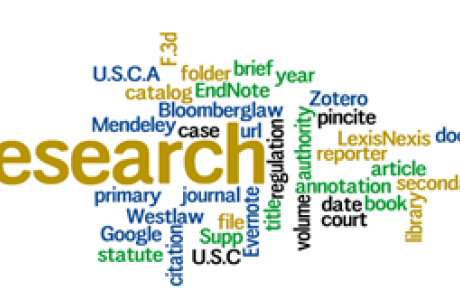Summer Research Strategies

Strategies for Summer Research
- Clarify the Scope of the Assignment (in writing).
- Ask good questions, even after you’ve started researching.
- Follow-up by email to confirm your understanding of the assignment, due date, and final work product expected.
- Take Notes on the Research (Process and Substance).
- Think about and plan your research strategy before going online and set time limits for researching. Everything will usually take longer than you estimate.
- Use folders on your computer or in the research systems to keep your materials but also keep detailed notes about your research process, search results, and what you found.
- Stop researching when you see the same results using different methods, confirmed you’re on the right track, and before you feel completely ready to stop.
- After you’ve started writing, return to researching to fill in the holes in your research and writing.
- Start by searching broadly and then narrow logically by relevant facts (when you are new to a topic or area of law, too much may be better than too little). And don’t forget about the jurisdiction. You can often find jurisdiction-specific secondary sources.
- Start by searching for legal concepts and narrow for relevant facts.
- Use Topic and Key Numbers and Headnotes.
- Use the One Good Case Method.
- Confirm your cases are still good law by Shepardizing or Key Citing.
- Always be (Advanced) Googling (ABG).
- For background, parties, news articles, statutes, judges, initial sources and information.
- Advanced Googling: https://www.google.com/advanced_search
- Site / domain Searching: site:cpsc.gov magnet ban OR recall (especially helpful for searching agency websites)
- AND OR make sure Boolean connectors are in all caps.
- Search Tools to limit/arrange by date
- Google for Research a guide for your topic:
- Wikipedia: entries on acts and code sections frequently provide the Public Law Number and background.
- Talk to the Librarian: don’t waste time with unproductive searches.
- Attend your firm’s library orientation and vendor trainings. Pricing and cost-effective strategies differ among firms and organizations. Be sure you understand research costs and cost recovery.
- Are there Practice-Group Specific/Recommended Sources? Specialty Databases outside of Lexis/Westlaw that you should be using?
- No Librarian? Ask your supervising attorney for her favorite sources. She may pull them off her shelf.
- Email us: reference.law@yale.edu. We are available all summer.
- Remember Cost Effective Techniques:
- See ABG for basic terms, citations, background.
- Get help early and often: vendors will give you search strings and appropriate databases.
- Call the librarian, court/agency/vendor/organization/YLS Librarian.
- Start with the Right Secondary Source:
- ALRs (American Law Reports) for Case Law Research
- Jurisdiction-specific secondary sources and legal encyclopedias. In Lexis/Westlaw, simply start to type these titles into the main search bar.
- Am Jur 2d = national legal encyclopedia
- NY Jur = NY Legal Encyclopedia
- Cal Jur 2d or Witkin Summary of California Law = California Legal Encyclopedia.
- CRS Reports (Congressional Research Service Reports): Statutes, current events, federal matters; Google, Proquest Congressional (VPN) , EveryCRSReport.com, Morris (Law Library Catalog).
- Library of Congress Research Guides
- Yale Law Library Country by Country Guide
- Start with What You Know (you always know something):
- Code Section = Public Law, Editors and Revisers Notes (changes to the code section), Committee Reports, Secondary Sources, Cases (Notes of Decisions, Citing References). Need help understanding the US Code, see Detailed Guide to the US Code, Office of Law Revision Counsel.
- Name of Act = Popular Names Table; Office of Law Revision Council (US Code, Popular Names Table)
- Case Name = One Good Case Method: Use the Headnotes, Citing References, Cases Cited therein
- Name of Doctrine or Theory = Secondary Source.
- Regulation = Cases, Source, Statutory Authority (enabling act)
- Agency = Enacted and pending regulations; Structure, Statutory Authority, Reports, Misc., Regulatory History Materials
- Subject / Topic / Area = Secondary Source, Bloomberg Legal Research Bundle, Research.
- Remember, Boolean Searching Basics and the Beauty of the Topic and Key Number System.
- Grammatical Connectors: words within the same sentence or paragraph: use /s /p.
- Asylum /s fear /s persecution = finds documents with these words in the same sentence (narrow searching technique)
- Gang /p (violence or harm) = finds documents with the word “gang” in the same paragraph as violence or harm.
- Use Advanced Search Fields.
- One Topic and Key Number in can lead you to cases in any/all jurisdictions.
- Don’t forget:
- CRS Reports
- Library of Congress Research Guides
- Congress.gov
- Agency Websites
- Federal Register.gov / Regulations.gov / Reginfo.gov
- Using Google Scholar (linked to Yale Law Library) to find Law Review Articles
- Sources for 50 State Surveys: Lexis, Westlaw, National Conference of State Legislatures.
- Court websites for rules
- State legislative/ agency websites
- Office of Law Revision Counsel USC Code (unannotated)
- Legal Information Institute, Cornell LII: primary and secondary authority
- YLS Library will mail / scan books and book chapters. E.g. Penny Hazelton, Specialized Legal Research (2015) (for securities, UCC, federal tax, copyright, labor and employment, environmental protection, law of the sea, immigration law, military and veterans, banking, federal patent and trademark, government contacts, customs law).
- Call or write for help.
Greatest Hits or reliable, well-known secondary sources (don’t reinvent the wheel):
Topic
| Source
|
Federal Civil Procedure
| Wright and Miller, Federal Practice and Procedure (WL)
Moore’s Federal Practice (Lexis)
|
Antitrust
| Antitrust Laws and Trade Regulation (Lexis)
McCarthy on Trademarks and Unfair Competition (WL)
Callmann on Unfair Competition, Trademarks & Monopolies (WL)
|
Bankruptcy
| Collier on Bankruptcy (Lexis)
|
Civil Rights
| Civil Rights and Civil Liberties Litigation: The Law of Section 1983 (W)
Smolla, Federal Civil Rights Act (W)
|
Constitutional Law
| Tribe, American Constitutional Law
Chemerinsky, Constitutional Law: Principles and Policies
Modern Constitutional Law (WL)
Rotunda and Nowak, Treatise on Constitutional Law (WL)
CRS, The Constitution of the United States: Analysis and Interpretation
|
Copyright / Intellectual Property
| Nimmer on Copyright (Lexis)
Patry on Copyright (WL)
Migram on Trade Secrets (Lexis)
|
Criminal Law and Procedure
| Wharton’s Criminal Law (WL)
Rudenstein, Criminal Constitutional Law (Lexis)
La Fave, Criminal Procedure (WL)
Hall, Search and Seizure (Lexis)
|
Fourth Amendment
| La Fave, Search & Seizure: A Treatise on the Fourth Amendment (WL)
|
Evidence
| Weinstein’s Federal Evidence (Lexis)
Mueller, Evidence: Practice Under the Rules (WL)
|
First Amendment
| Smolla and Nimmer on Freedom of Speech: A Treatise on the First Amendment (WL)
|
Patents
| Chisum on Patents (Lexis)
|
Statutory Construction
| Sutherland, Statutes and Statutory Construction (WL)
|
Torts
| Prosser and Keeton on the Law of Torts
Dobbs on Law of Torts (WL)
|
State Sources (selected)
| California: California Jurisprudence; Witkins California Practice
Connecticut: Connecticut Practice Series
Massachusetts: Massachusetts Practice Series
New Jersey: New Jersey Practice Series
New York: N.Y. Jurisprudence; New York Practice; Siegel’s New York Practice |
- International Sources:
- Foreign and International Legal Research Guides and Sources, Yale Law School Law Library (Globelex and World LII.
- Lexis, WL, Bloomberg have foreign and international primary and secondary materials.
- Law Library of Congress Resources and Research Guides
- Max Plank International Legal Encyclopedia of Public International Law as a starting point.
- Interdisciplinary Sources:
- Yale University Library Subject Guides for leading databases
- Amicus briefs and similar filings on Lexis, Westlaw, and Bloomberg
- Congressional Hearings on Proquest Congressional, Proquest Legislative Insight, Congress.gov
- Heinonline collections (e.g. Women and the Law; Religion and the Law; Slavery in America)
- JSTOR, Project Muse databases (VPN)
- Proquest Dissertations and Thesis Full-text (VPN)
- Social Science Full-text Database (VPN)
- News Sources:
- Lexis / Westlaw / Bloomberg News and Legal News Databases
- Bloomberg / BNA Law Reports: topical subscriptions
- Proquest Historical Newspapers Database; Proquest Alt-Press Watch (VPN)
- Factiva and Lexis Academic Database (VPN)
- Duke Reporters’ Lab
- Wall Street Journal and New York Times, YLS provides subscriptions
- Law Student Scholarship:
- Innovations in Legal Research
